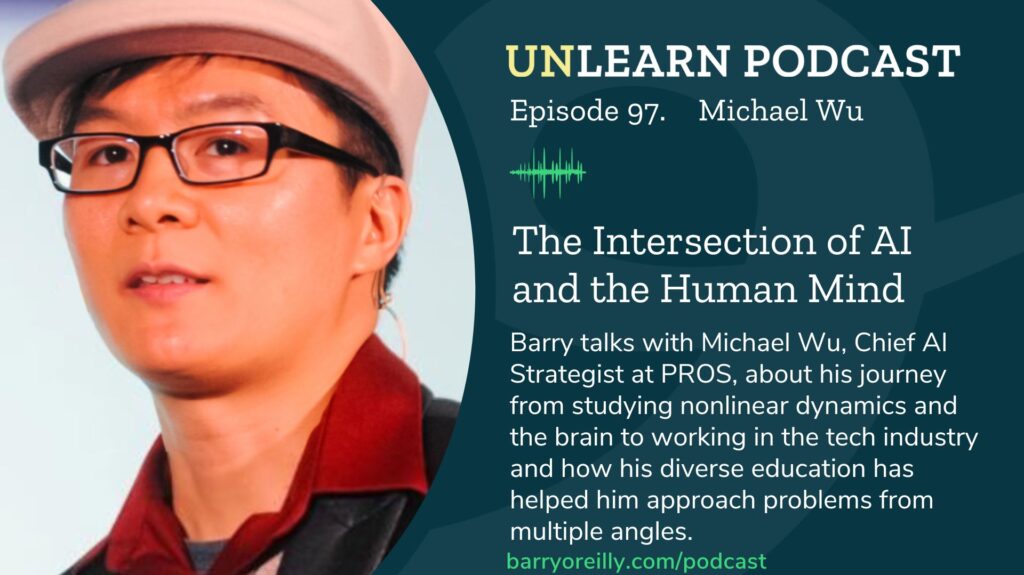On this episode of the Unlearn podcast, host Barry O’Reilly is joined by Michael Wu, Chief AI Strategist at PROS. Michael is a seasoned expert in the field of AI, with over 25 years of experience and a background in math, physics, and molecular biology. Michael shares his journey from studying nonlinear dynamics and the brain to working in the tech industry and how his diverse education has helped him approach problems from multiple angles. Hear how Michael Wu sees the intersection of AI and the human mind and how AI is impacting our lives now and into the future.
A Strong Desire to Understand
“The conviction is just a strong desire to understand something,” Michael tells Barry. “At the bottom of my heart, I think even right now, in my current role, I still try to understand a lot of things fundamentally.” Barry asks Michael about his decision to change his approach to studying the brain. Michael explains that his decision was driven by a strong desire to understand how the brain works, and he felt that using a physics-based approach would be impractical. He was fascinated by the biology-based approach and felt that taking this approach, along with a top-down approach, would provide a deeper understanding of social media platforms and why people use them. He explains that combining both approaches allowed him to reach a deeper understanding than either approach alone would have. [Listen from 5:20]

How Influence Propagates
One area Michael has been studying deeply over the years is the idea of how influence spreads. We all influence others and we’re also always being influenced. Barry asks Michael, “What were some of the interesting surprises that you found as you were trying to model this idea of what influence is?” Michael responds that he identified six factors that were necessary for influence to propagate. By understanding how people shared, how frequently they shared, who they shared with, the timeliness of their responses, and other behavioral profiles, he was able to identify influencers before they became popular. He encourages brands to cultivate these “influencers in the making” as potential advocates. [Listen from 10:10]
(Listen to Teamwork Makes the AI Work with Bill Higgins, Director of Watson Research and Development at IBM)
Pricing and Sales Efficacy
PROS dubs itself ‘A CFO’s best kept secret to profitable growth’. This is because the company’s main focus is on pricing and sales efficacy. Pricing has been shown to have a more significant impact on monetization than any other factor: a 1% change in price can lead to as much as 11% improvement in margins! The second tool provided by PROS is sales efficacy, which helps companies have a more effective and efficient sales team.
Michael explains that his work mainly falls under the category of demand forecasting, which involves finding the right balance between supply and demand. This balance is determines the equilibrium price, which optimizes revenue when supply matches demand.
The airline industry is a good example of how supply and demand are closely linked. However, it can be difficult to accurately predict demand far into the future, especially in industries like airlines. You need a combination of mathematics and predictive science to find an optimal balance. Michael notes that AI provides interesting capabilities to help solve these problems, but it’s not as easy as it appears. There are some things people need to unlearn in order to benefit from the recommendation created by AI solutions. [Listen from 14:05]
(Listen to Knowledge (and Diversity) is Power with Gisela Martinez, Executive Director for Clinical Research at Merck)
How AI Impacts Our Lives
Artificial intelligence and data analysis can help companies make decisions based on data rather than just trusting instincts. A good example is GPS navigation systems, which have now evolved to optimize routes based on travel time, traffic patterns and weather. Michael encourages businesses to learn to trust the data and use it to their advantage, even if the answers might be unexpected.
AI is changing the way we live and interact with technology, creating new and exciting possibilities. Nowadays, you can find practical applications of AI in many areas. For example, AI is used:
- to optimize your battery usage and screen brightness on your smartphone;
- to help businesses optimize SEO, marketing, targeting, and pricing;
- to provide frameworks to help writers create high quality content more efficiently;
- to generate images based on text prompts.
AI can provide businesses with a great deal of economic benefit, largely due to efficiency gain. It is not necessarily as good as humans, but it can still be leveraged to solve some problems, to spur creativity and speed up feedback cycles.
“People don’t realize that the AI sometimes doesn’t have to be as good as a human to be beneficial,” Michael points out. “In many cases, it doesn’t have to be. It just needs to be good enough. It doesn’t even need to be as good as you. But if it could be like 70% as good as a human, it could help you tremendously by making your work or your processes a lot more efficient.”
AI is being used in many areas, whether we are aware of it or not, and those who do not embrace it risk being left behind, Michael warns. [Listen from 24:00]















